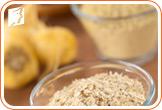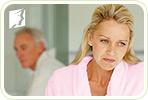The menopause transition generally occurs between 45-55, although it can occur significantly earlier. Throughout the years of the transition, hormone levels, particularly those of estrogen, progesterone, and testosterone, fluctuate and drop significantly. This can imbalance the body, causing a variety of different menopause symptoms. Common symptoms include hot flashes, night sweats, irregular periods, vaginal dryness, loss of libido, hair loss, weight gain, mood swings, and more. However, there are a variety of different treatments available to help ease menopause symptoms
Lifestyle Changes

There are a number of common lifestyle changes and adjustments that can have a great deal of impact on your menopause symptoms. Some of these include:
Regular exercise. Exercise releases serotonin, a chemical in the brain that makes you happy. This can relieve stress, anxiety, and fatigue associated with menopause, as well as balancing hormone levels and decreasing incidences of menopause symptoms in general.
Healthy diet. Getting all the essential vitamins and nutrients needed to nourish the body goes a long way to balancing hormone levels and decreasing the frequency and severity of menopause symptoms.
Avoid triggers. There are a number of foods that can worsen the severity and frequency of menopause symptoms. This is because they imbalance hormones further, or stimulate the release of stress hormones. Some examples of triggers include caffeine, alcohol, and cigarettes. Spicy foods can also trigger hot flashes and night sweats. Many women have specific personal triggers too, so its important to record what you've been doing or eating before a menopause symptom hits.
Get sufficient sleep. Lack of sleep can imbalance your body and worsen symptoms. Make sure to get 8 hours of sleep a night. Nap during the day if you need to.
Stay hydrated. Many symptoms, such as hot flashes and night sweats, can easily lead to dehydration. Carry a water bottle around with you wherever you go.
Remember there are specific treatments you can use for each symptom. For example, changing your hair style can reduce hair loss. Changing the fabric of your pajamas can reduce night sweats, while wearing layers can stop hot flashes. Always research each symptom individually for more information.
Alternative Treatments

There are multiple different types of alternative treatments available, if you find that lifestyle changes aren't working. These include:
Phytoestrogens. These herbs contain an estrogenic substance that can mimic the effects of estrogen in the body, thereby alleviating estrogen deficiency based symptoms. One of the most common phytoestrogens, soy, is easily added to any diet.
Hormone-regulating herbs. These herbs nourish the hormonal glands and incite your body to produce more estrogen naturally.
- Acupuncture. This traditional Chinese treatment helps regulate and restabilize the flow and energy of your body.
Medications
In severe situations where symptoms are playing a significant role in your life, there may be medical treatments available. If you're interested in this option, talk to your doctor for more information.
Sources
- BMJ Group. "Menopause: What is it?" Patient Leaflet. 2007.
- Hopkins, Virginia. Lee, John R. M.D. What Your Doctor May Not Tell You About Menopause. New York: Warner Books Inc., 1996.
- Love, Susan M.D. Menopause and Hormone Book. New York: Three Rivers Press, 2003.
- Martin, Raquel. The Estrogen Alternative. Rochester, VT: Healing Arts Press, 2000.



